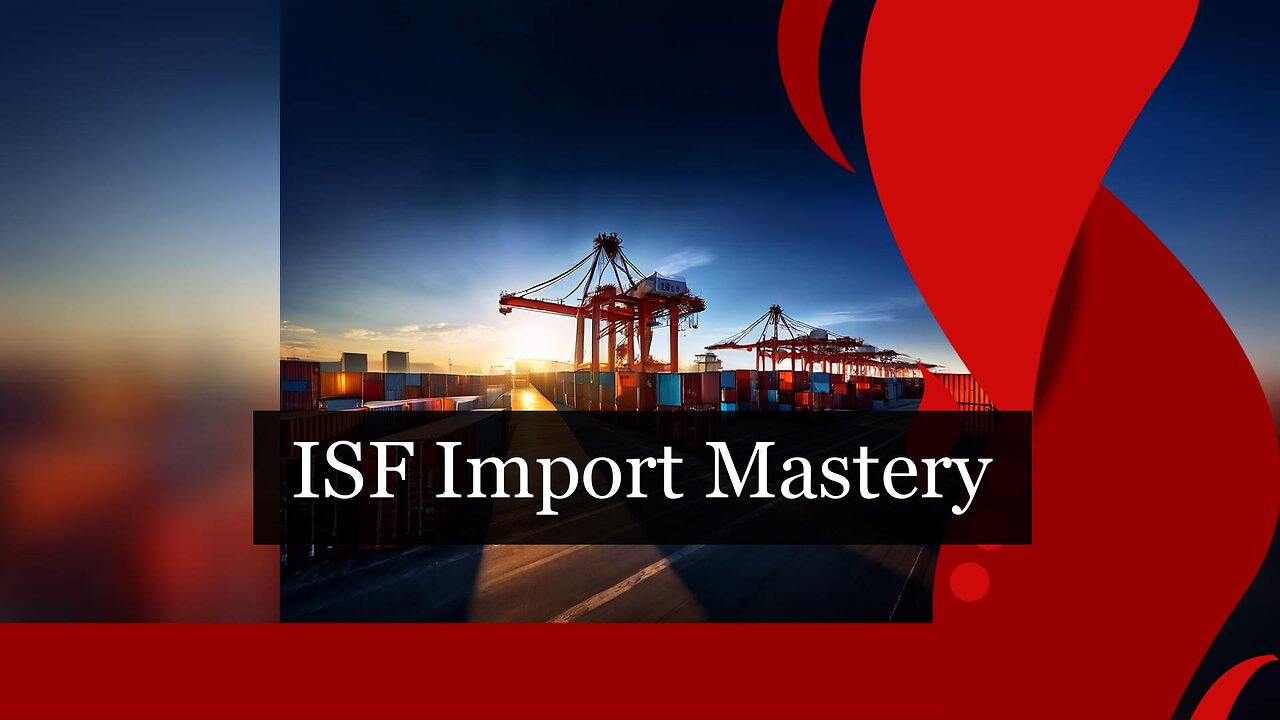Premium Only Content

Navigating the Responsibilities of an ISF Importer in International Trade
ISF Checklist || 805-970-7918 || contact@isfchecklist.com || www.isfchecklist.com
In this video, the concept of a customs bond is briefly explained as a financial guarantee that ensures compliance with customs regulations and payment of duties and fees. The focus then shifts to Importer Security Filing (ISF), which is a mandatory filing requirement by the US Customs and Border Protection (CBP) for importers bringing goods into the United States. The purpose of ISF is to enhance supply chain security by providing CBP with advance information about the cargo being imported.
As an ISF Importer, there are several responsibilities and obligations that must be fulfilled. Firstly, the ISF Importer is responsible for submitting the ISF to the CBP at least 24 hours before the goods are loaded onto the vessel destined for the United States. The ISF should include crucial information such as the seller, buyer, country of origin, HTS codes, and more, providing essential details about the cargo being imported.
Another important responsibility of an ISF Importer is to maintain accurate and complete records of all import transactions. This includes keeping relevant import documentation such as purchase orders, commercial invoices, bills of lading, and any other supporting documents. These records may be audited by CBP to ensure compliance with customs regulations.
Cooperating with CBP in matters related to cargo security and compliance is also a key responsibility of an ISF Importer. This involves providing timely and accurate information when requested by CBP officers and ensuring that the imported cargo meets all applicable safety and security standards set by CBP.
Although an ISF Importer can handle these responsibilities on their own, it is highly recommended to work with a customs broker to navigate the complexities of customs regulations. A customs broker is an expert in managing import transactions and can provide guidance and assistance throughout the process.
Finally, the importance of a customs bond is reiterated. As an ISF Importer, having a customs bond is required to ensure compliance with customs regulations. The customs bond acts as a financial guarantee and protects the interests of CBP in the event of non-compliance or non-payment of duties and fees.
To conclude, this video provides a comprehensive overview of the responsibilities and obligations of an ISF Importer. Working with a customs broker and having a customs bond are essential elements for successful compliance in the realm of customs brokerage.
#usimportbond #isfcustomsbroker #uscustomsclearing #isfentry
Video Disclaimer Here: This video is purely educational and has no ties with the US government.
0:31 - Customs Bond A customs bond is a financial guarantee ensuring compliance with customs regulations and payment of duties and fees, essential for importers in international trade.
0:41 - Importer Security Filing (ISF) ISF is a mandatory filing requirement by CBP for importers bringing goods into the US, enhancing supply chain security by providing advance cargo information.
2:14 - ISF Importer Responsibilities Responsibilities include timely ISF submission, maintaining accurate import records, cooperating with CBP on security and compliance matters, and potentially working with a customs broker for guidance.
2:32 - Importance of Customs Bond ISF Importers must have a customs bond to ensure compliance with regulations, acting as a financial safeguard in case of non-compliance or non-payment of duties and fees.
-
 LIVE
LIVE
Slightly Offensive
3 hours ago $2.86 earnedCandace REDPILLS the Masses in BOMBSHELL Theo Von Interview | Guest: Shane Cashman
1,214 watching -
 UPCOMING
UPCOMING
DLDAfterDark
14 minutes agoDLD Live! That Sh... Will Get You K***ed! What To Consider in SHTF
-
 LIVE
LIVE
megimu32
3 hours agoON THE SUBJECT: IRL Streamers Attacked & Nostalgic Animal Movies That Made Us Cry
539 watching -
 1:00:54
1:00:54
The Tom Renz Show
7 hours agoMore Epstein/FBI, a Scary Trade War, & the Dem Echo Chamber
7.49K1 -
 40:43
40:43
Kimberly Guilfoyle
8 hours agoDems Double Down on Delusion-Why? Live with Tony Kinnett & Bo French | Ep.202
77.8K35 -
 1:28:42
1:28:42
Redacted News
6 hours agoBREAKING! SOMETHING BIG IS HAPPENING IN EUROPE ALL OUT WAR IS COMING AGAINST RUSSIA, TRUMP FURIOUS
121K282 -
 47:50
47:50
Candace Show Podcast
6 hours agoBREAKING: Judge Makes Statement Regarding Taylor Swift's Text Messages. | Candace Ep 155
113K113 -
 1:14:23
1:14:23
Josh Pate's College Football Show
3 hours ago $0.29 earnedCFB’s Most Hated Teams | FSU & Clemson Future | Big Ten Win Totals | Star Rankings Overrated?
14.5K -
 1:33:47
1:33:47
CatfishedOnline
5 hours agoGoing Live With Robert - Weekly Recap
27.8K -
 55:18
55:18
LFA TV
1 day agoEurope’s Sudden Turn Against America | TRUMPET DAILY 3.6.25 7PM
32.2K3